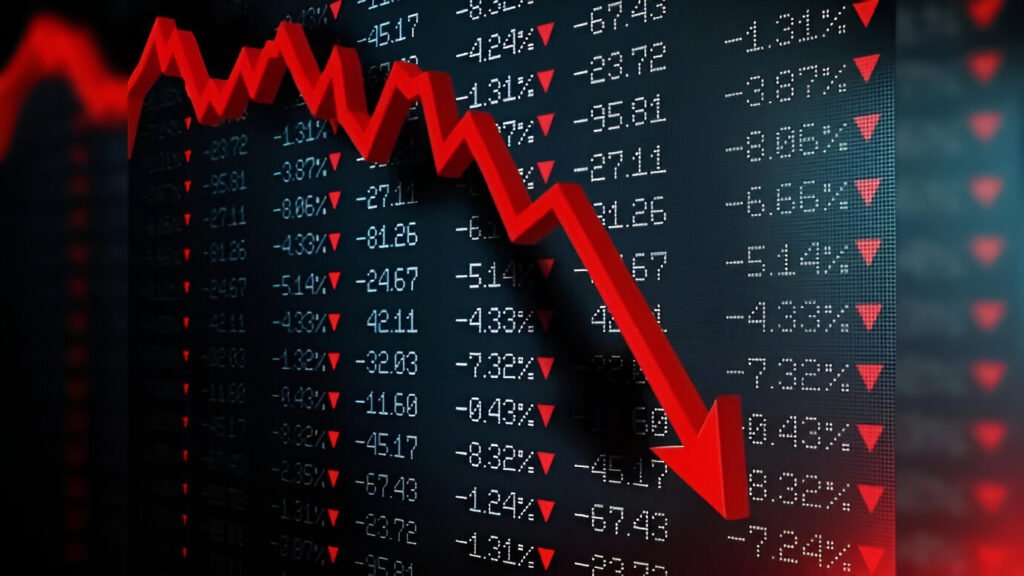
The Indian stock markets have recently experienced significant fluctuation with high volatility, with both the Sensex and Nifty indices seeing declines at a huge rate. On April 7, 2025, the Sensex came down by over 2,200 points, closing at 73,137.90, while the Nifty 50 tanked 742.85 points to settle at 22,161.60. This downturn has raised several concerns among the investors. There are various interrelated factors that have contributed to this market turbulence
1. Escalation of Global Trade Tensions
A primary factor for the recent market downturn is the increasing tensions among the ongoing global trade. The president of USA Mr. Donald Trump announced reciprocal tariffs which created fear of a phenomenon we usually call Global Trade war. China countered this with imposing higher tariffs on US goods that has further increased the tension amongst the two super powers of the world. These incidents have also disrupted the global trade flows which leads to sort of uncertainty in the markets.
2. Fears of a Global Economic Slowdown
The escalating trade war has raised concerns about a potential global economic slowdown. Major world economies are witnessing slow growth forecasts due to disturbed trade relations and continuously increasing tariffs. Goldman Sachs, for instance, has raised the probability of a U.S. recession to 45%, citing rigid financial conditions and high chances of policy uncertainty. Such apprehensions have led investors to adopt a risk-free stance, which results in a shift of capital from equities to safer prospects.
3. Decline in Global Equity Markets
These are the side-effects of the trade war evident across the global equity markets. European and Asian markets have suffered huge amount of losses, with indices like Japan’s Nikkei 225 and Hong Kong’s Hang Seng experiencing sharp declines. This global sell-off has negatively impacted the sentiments of investors in India, contributing to the bearish trend observed in domestic markets.
4. Depreciation of the Indian Rupee
The Indian rupee has recently faced considerable depreciation pressures, recording its biggest one-day decline in nearly three months. On April 7, 2025, the rupee closed 0.7% lower at 85.8350 against the U.S. dollar. A weaker rupee directly makes imports more expensive and this leads to higher inflation, further hampering the investor’s confidence and impacting market performance.

5. Sector-Specific Challenges
Certain sectors have been more affected than others in a negative way. The Information Technology (IT) sector, for instance, has come up as one of the biggest casualties while the fear of escalating U.S. recession. Additionally, metal stocks have faced some serious declines due to tensions over decrease in global demand and increase in tariffs.
6. Profit Booking and Valuation Concerns
After a long bullish phase, markets often witness periods of profit booking where investors usually sell off their shares to realize some gains. With the high valuations of some segments of the Indian market, any negative news can seriously damage sell-offs as investors seek to lock in their profits.
7. Geopolitical Tensions
Beyond the recent trade wars, there are other geopolitical tensions, such as rising conflicts in the Middle Eastern countries, have contributed to instability in the global market. Such uncertainties push investors to move away from equities, considered as riskier assets, towards mor safe places like gold and government bonds.
Conclusion
The recent downturn in the Indian stock markets is a combination of global trade tensions, fears of an economic slowdown, currency depreciation, and geopolitical difficulties. While these factors have collectively led to the current market instability, it’s important for investors to maintain a long-term perspective. Market fluctuations are regular, and such periods of decline can present great opportunities for informed and strategic investment decisions by investors. Staying updated with global developments and timely consultation with financial advisors can help in navigating these troublesome times effectively.







